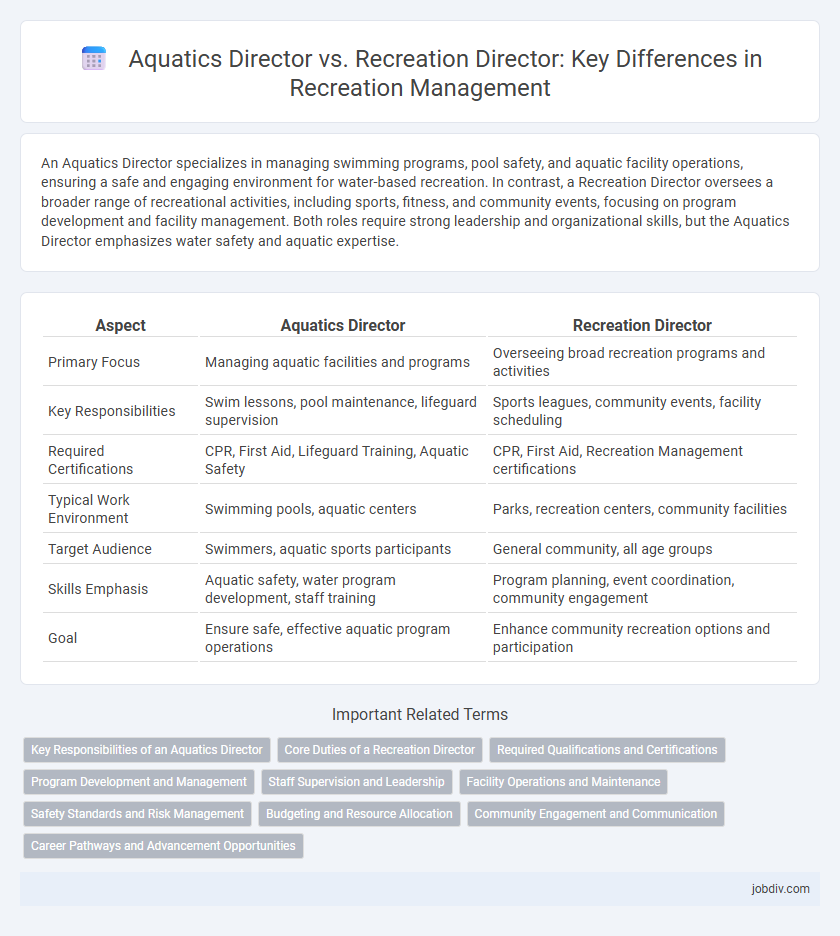An Aquatics Director specializes in managing swimming programs, pool safety, and aquatic facility operations, ensuring a safe and engaging environment for water-based recreation. In contrast, a Recreation Director oversees a broader range of recreational activities, including sports, fitness, and community events, focusing on program development and facility management. Both roles require strong leadership and organizational skills, but the Aquatics Director emphasizes water safety and aquatic expertise.
Table of Comparison
| Aspect | Aquatics Director | Recreation Director |
|---|---|---|
| Primary Focus | Managing aquatic facilities and programs | Overseeing broad recreation programs and activities |
| Key Responsibilities | Swim lessons, pool maintenance, lifeguard supervision | Sports leagues, community events, facility scheduling |
| Required Certifications | CPR, First Aid, Lifeguard Training, Aquatic Safety | CPR, First Aid, Recreation Management certifications |
| Typical Work Environment | Swimming pools, aquatic centers | Parks, recreation centers, community facilities |
| Target Audience | Swimmers, aquatic sports participants | General community, all age groups |
| Skills Emphasis | Aquatic safety, water program development, staff training | Program planning, event coordination, community engagement |
| Goal | Ensure safe, effective aquatic program operations | Enhance community recreation options and participation |
Key Responsibilities of an Aquatics Director
An Aquatics Director oversees the safety, programming, and maintenance of aquatic facilities, ensuring compliance with health and safety regulations and lifeguard certification standards. Key responsibilities include managing swim lesson programs, coordinating pool schedules, and supervising aquatic staff to deliver effective water-based recreation services. This role demands expertise in water safety protocols and emergency response planning, distinguishing it from the broader scope of a Recreation Director.
Core Duties of a Recreation Director
A Recreation Director oversees a broad range of community programs including sports leagues, fitness classes, and cultural events, focusing on enhancing overall community engagement and well-being. Core duties involve planning, organizing, and supervising recreational activities, managing budgets, and coordinating facility usage to meet diverse public interests. Unlike an Aquatics Director who specializes in swimming programs and pool management, the Recreation Director addresses a wider spectrum of recreational services and staff supervision.
Required Qualifications and Certifications
Aquatics Directors typically require certifications such as Lifeguard Training, CPR/AED, and Water Safety Instructor credentials, along with experience in pool management and aquatic program development. Recreation Directors often need broader qualifications including a degree in Recreation Management or a related field, CPR certification, and expertise in organizing diverse community programs. Both roles demand strong leadership skills, but the Aquatics Director's certifications are specifically focused on water safety and aquatic facility operations.
Program Development and Management
Aquatics Directors specialize in developing and managing water-based programs such as swimming lessons, lifeguard training, and aquatic fitness classes, ensuring safety protocols and facility compliance are rigorously maintained. Recreation Directors oversee a broader scope of program development, including sports leagues, community events, and leisure activities, coordinating diverse staff and resources to meet community needs. Both roles require strategic planning and budget management, but Aquatics Directors demand expertise in water safety regulations and pool maintenance technologies.
Staff Supervision and Leadership
Aquatics Directors specialize in overseeing pool operations, lifeguard teams, and aquatic programming, ensuring safety compliance and staff training for water-based activities. Recreation Directors manage a broader range of programs, supervising staff across various departments like sports, arts, and community events while providing leadership in facility management and program development. Effective staff supervision in aquatics requires certification knowledge and emergency response skills, whereas recreation supervision demands diverse program expertise and community engagement leadership.
Facility Operations and Maintenance
Aquatics Directors specialize in overseeing pool and water facility operations, ensuring water quality, safety compliance, and proper maintenance of aquatic equipment. Recreation Directors manage a broader range of facility operations, including parks, sports complexes, and community centers, emphasizing overall maintenance and programming coordination. Both roles require strategic planning, but Aquatics Directors concentrate on water-specific systems and lifeguard staff supervision, while Recreation Directors handle diverse recreational facility upkeep and multifunctional space management.
Safety Standards and Risk Management
An Aquatics Director specializes in overseeing swimming pool operations, ensuring strict compliance with water safety standards, lifeguard certification, and emergency response protocols to minimize drowning risks. A Recreation Director manages a broader range of activities, implementing comprehensive safety standards across various facilities, including playgrounds, sports fields, and community centers, focusing on injury prevention and incident reporting. Both roles prioritize risk management but differ in scope, with Aquatics Directors emphasizing aquatic hazard control while Recreation Directors address diverse recreational safety challenges.
Budgeting and Resource Allocation
An Aquatics Director typically manages budget allocations specifically for pool maintenance, lifeguard staffing, swim programs, and aquatic facility upgrades, requiring precise forecasting of water treatment costs and safety equipment needs. In contrast, a Recreation Director oversees a broader budget encompassing multiple recreational facilities, scheduling diverse activities, staffing various programs, and allocating resources across parks, gyms, and community centers. Resource allocation for an Aquatics Director is highly specialized, focusing on water safety and aquatic sports, while a Recreation Director balances funding across a wide range of recreational services and infrastructure maintenance.
Community Engagement and Communication
Aquatics Directors specialize in managing pool operations and safety protocols, deeply engaging with community members through swim programs and aquatic events to promote water safety and fitness. Recreation Directors oversee a broader range of activities, fostering community involvement by organizing diverse recreational programs and coordinating communication among various departments and local organizations. Effective communication skills and a strong focus on community engagement are critical for both roles to ensure successful public participation and program development.
Career Pathways and Advancement Opportunities
Aquatics Directors specialize in managing water-based programs, overseeing swimming facilities, and ensuring safety compliance, with career advancements often leading to senior aquatic management or specialized training roles. Recreation Directors have a broader scope, managing diverse recreational activities, facility operations, and community engagement, advancing toward executive leadership or program development positions. Career pathways for both roles benefit from certifications like CPR, lifeguard training for Aquatics Directors, and recreational management credentials for Recreation Directors, enhancing progression opportunities.
Aquatics Director vs Recreation Director Infographic

 jobdiv.com
jobdiv.com